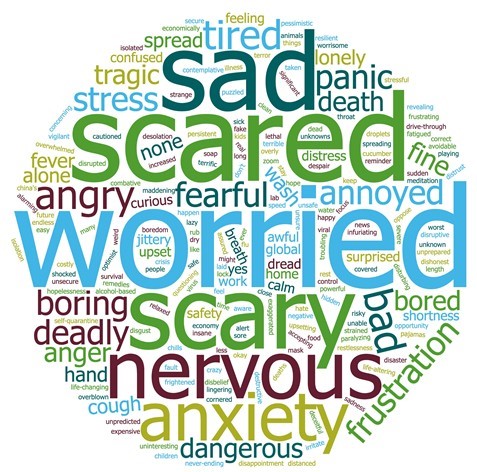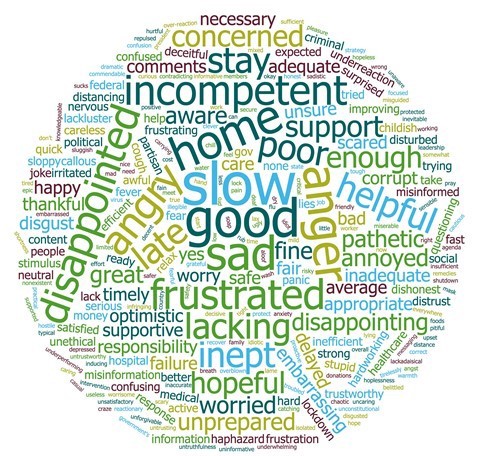Juries and jury trials may end up dramatically affected by who is willing to show…

The Changing Shape of Juries During COVID-19
The question we’ve been asked the most by clients the past few months is: When we get back to trial, how will my jury have changed because of COVID- 19? To answer this, TBC has conducted a pair of national surveys over the past two months, each with more than a thousand respondents.
The Key Question: Who Shows Up?
When thinking about how COVID-19 will change juries, most in the legal industry have focused on broad changes in people’s experiences and attitudes, then deducing how this will impact jurors and juries. This makes sense – and we’ve been tracking this data too – though the results are not particularly surprising. As is often the case in times of crisis, anxiety is up, social capital and economic stability are down, and individuals’ locus of control are trending external. We and other jury consultants have seen how these factors impact jurors in past crises and have a good handle on how they are likely to impact different kinds of cases now.
However, unlike many others, we’ve also focused our efforts on identifying how the COVID-19 out- break will change who serves on juries. Said differently, how many jurors are going to be hesitant or outright refuse to serve on a jury until the outbreak is over? And how are those jurors different from jurors who are willing to serve during COVID-19?
Jury-Eligible Population Remains Cautious About Reopening
Before pivoting specifically to jury service, it is important to broadly address how people feel about the safety measures put in place during COVID-19. By and large, Americans continue to favor caution. Those who want to return to “normal” aggressively are a small but loud minority. We were expecting this to be a relatively dynamic attitude and anticipated some change between our May and June surveys, as communities across the nation began to loosen restrictions – some more quickly than others. We were surprised when our data revealed virtually no change in how Americans felt about a variety of related indicators:
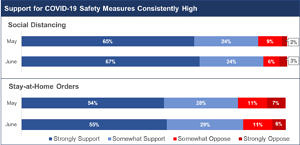
The Vast Majority of Respondents Are Concerned About Jury Duty – and Many Are Hesitant or Unwilling to Serve
We asked jurors a number of specific questions to gauge how willing they would be to return to jury duty during COVID-19. The data makes clear just how reluctant many Americans are to do so, as the following graphs illustrate:
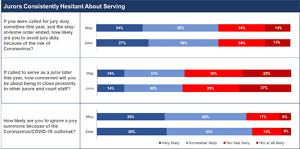
This data leaves little doubt that juries will look different during COVID-19, as many jurors will either refuse to show for jury duty out of fear for their health or take any opportunity to get out of jury duty as soon as possible (while this segment of the population always exists, it will be far larger during COVID-19). Exacerbating this effect will be the fact that many more jurors will have legitimate claims of economic hardship in the coming months. Further, we fully expect judges – most of whom are elected officials – to show much greater leniency across the board during the outbreak. The bottom line is that juries in the near-to-medium term are likely to be dominated by jurors who have the means and willingness to serve.
Changes in Juries During COVID-19 Will Give a Zero-Sum Advantage
So how will the jurors who are willing to serve differ from those who aren’t, if at all? Analysis of our survey data has made clear that there are numerous, independent, and statistically significant differences between those who will and won’t show or serve.
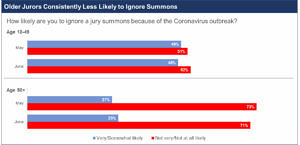
Unsurprisingly, the “squeaky wheel” that is strongly opposed to social distancing and stay-at-home orders is disproportionately willing to serve. Interestingly, so too are older jurors (a finding consistent with our May survey, which we covered in a previous post).
This finding surprised us quite a bit, as these individuals are most at risk from COVID-19. We suspect the greater willingness of those over 50 to serve is down to a combination of higher financial stability (obviously many are on fixed, stable incomes from pensions and other retirement funds), a greater sense of civic duty, and perhaps, a more cavalier or fatalistic attitude toward the risk of COVID-19 (or this could just be my parents – sorry Mom and Dad!).
In addition, a number of traits that regularly correspond to plaintiff and defense orientation in civil cases have turned up predictive of how willing certain jurors are to serve. Many might surprise you. However, we are reserving these insights for our clients. If you’d like to hear more, please reach out to me at sduffy@trialbehavior.com or my colleague Laura Clementi at lclementi@trialbehavior.com.

